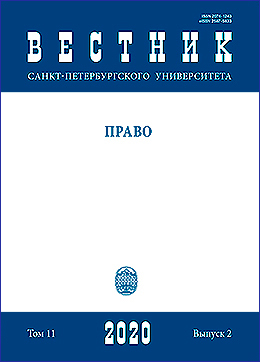Party will autonomy in public-private partnership: Procedural aspects
DOI:
https://doi.org/10.21638/spbu14.2020.204Abstract
The article examines the problems of the realization of the autonomy of parties in the process of selecting ways to resolve disputes from public-private partnerships. A public-private partnership is considered as a type of contractual relationship based on the autonomy of will of the parties (the autonomy of the parties). The autonomy of the parties is one of the principles of private relations and is implemented in the material and procedural aspects. The opinion is expressed that the autonomy of the parties was formed as a principle in not only private, but also civil procedural and transnational procedural law. In procedural relations, it is expressed in the freedom to choose the method of resolving a dispute. The procedural autonomy of the parties is limited by imperative norms of national legislation. A comparison is made of methods for resolving disputes from public-private partnerships recommended by international intergovernmental universal and regional organizations and enshrined in domestic and foreign legislation. The protection mechanisms offered by international organizations are based on freedom of choice when selecting a method for dispute resolution by the parties, however, the state may limit the autonomy of the parties in the freedom of choice of procedures. An assessment is made of the prospects for the use of alternative procedures as an effective means of resolving disputes between the state and business structures. There is considerable potential for the extrajudicial procedures in the settlement of public-private partnership disputes. It is noted that in the legislation of the states that allow a foreign natural or legal person as a public partner, international commercial arbitration is usually introduced into the dispute resolution system. One of the trends in the development of the dispute resolution mechanism was the creation of specialized arbitrations for the settlement of disputes in the field of public-private partnerships.
Keywords:
public-private partnership, party will autonomy, dispute resolution, arbitration, procedural forms, mediation, mini-trail, adaptation of contracts
Downloads
References
Downloads
Published
How to Cite
Issue
Section
License
Articles of "Vestnik of Saint Petersburg University. Law" are open access distributed under the terms of the License Agreement with Saint Petersburg State University, which permits to the authors unrestricted distribution and self-archiving free of charge.






